新版新概念英语第一册第19课课堂笔记
- 格式:docx
- 大小:37.89 KB
- 文档页数:5
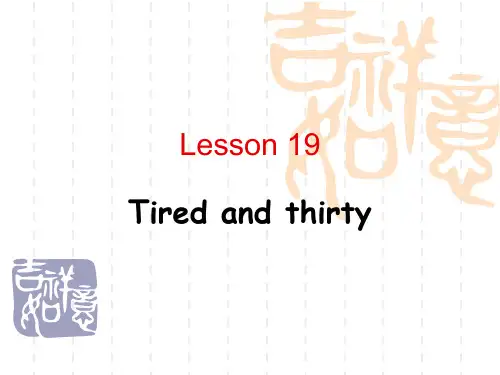
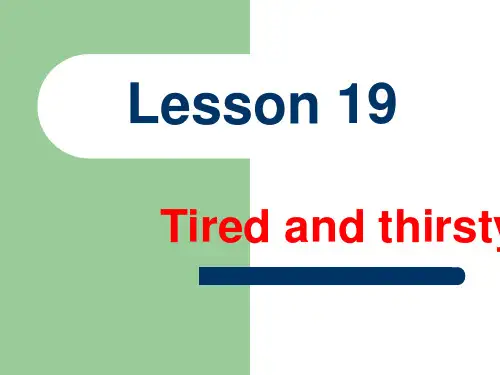
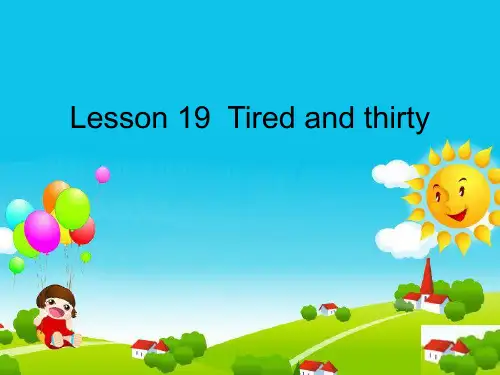
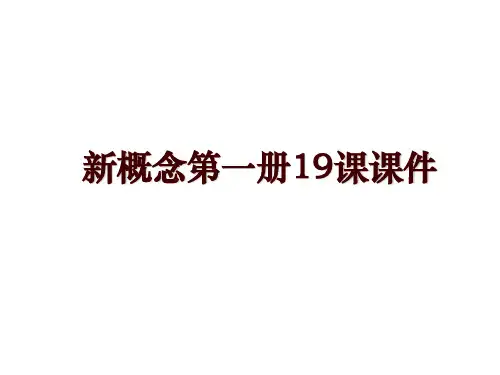
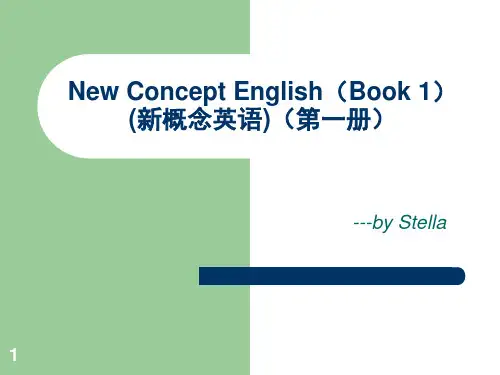
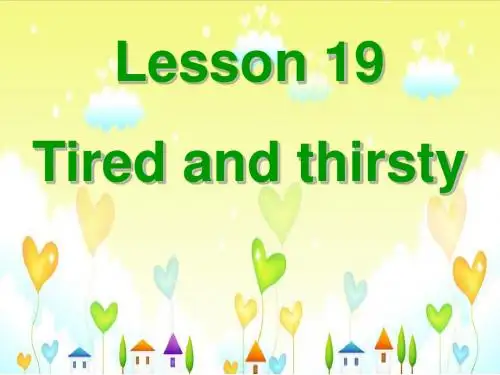

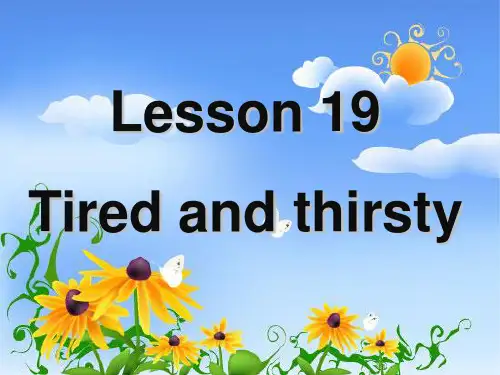
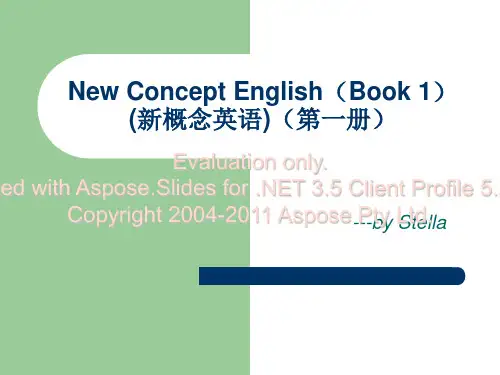

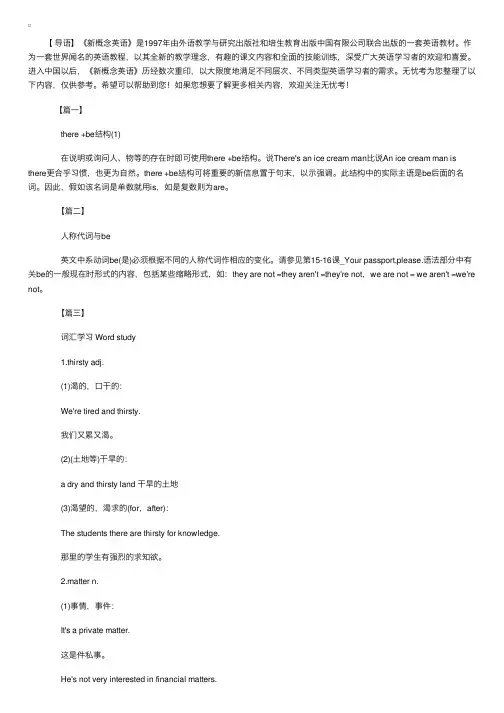
【导语】《新概念英语》是1997年由外语教学与研究出版社和培⽣教育出版中国有限公司联合出版的⼀套英语教材。
作为⼀套世界闻名的英语教程,以其全新的教学理念,有趣的课⽂内容和全⾯的技能训练,深受⼴⼤英语学习者的欢迎和喜爱。
进⼊中国以后,《新概念英语》历经数次重印,以⼤限度地满⾜不同层次、不同类型英语学习者的需求。
⽆忧考为您整理了以下内容,仅供参考。
希望可以帮助到您!如果您想要了解更多相关内容,欢迎关注⽆忧考!【篇⼀】 there +be结构(1) 在说明或询问⼈、物等的存在时即可使⽤there +be结构。
说There's an ice cream man⽐说An ice cream man is there更合乎习惯,也更为⾃然。
there +be结构可将重要的新信息置于句末,以⽰强调。
此结构中的实际主语是be后⾯的名词。
因此,假如该名词是单数就⽤is,如是复数则为are。
【篇⼆】 ⼈称代词与be 英⽂中系动词be(是)必须根据不同的⼈称代词作相应的变化。
请参见第15-16课_Your passport,please.语法部分中有关be的⼀般现在时形式的内容,包括某些缩略形式,如:they are not =they aren't =they're not,we are not = we aren't =we're not。
【篇三】 词汇学习 Word study 1.thirsty adj. (1)渴的,⼝⼲的: We're tired and thirsty. 我们⼜累⼜渴。
(2)(⼟地等)⼲旱的: a dry and thirsty land ⼲旱的⼟地 (3)渴望的,渴求的(for,after): The students there are thirsty for knowledge. 那⾥的学⽣有强烈的求知欲。
2.matter n. (1)事情,事件: It's a private matter. 这是件私事。
Lesson 19
阅读理解
(1)答案与解析
1. B。
⽂章中第⼀句提到。
2. A。
由⽂章题⽬可知。
3. C。
⽂章第⼀段最后⼀句为信息句。
4. C。
⽂章第⼆段第四句为信息句。
(2)答案与解析
1. 从Bill 说的No, this is Bill, Mike’s friend.可以看出,要这样回答:Bill is.
2. Bill 对 Kate 说No, he isn’t at home.说明Mike 不在家。
该题的答案是:No, he isn’t.
3. 由Bill 说的I think he’s at school.能够得知,该句要这样回答:He’s at school.
4. 对话中的Is Mr.s Green their English teacher?及Bill 的肯定回答已经告诉我们,正确的答案是:Mrs. Green is.
5. Bill 已经记起Mike 的号码是10,故应回答:He’s No. 10.
英汉翻译
1. What’s matter with you?
2. Are you all right now?
3. That old man is tired and hungry.
4. Sit down there.
5. These ice creams are nice.
6. These children are thirsty.
7. Are they hot or cold?
8. No, we are not ready.。
新版新概念英语第一册第19课课堂笔记
If someone has deceived you, don't get angry with him,
because everybody wants to make a living. And the way of life
is so narrow that you cannot but run into others.
It's nearly the end of the last year, most of us have
the habits to recollect what happened in the last year:
something good, something bad, something sad, something
happy … But no matter what happened, I think, the best
choice for everybody is try to be happy.
Lesson 55 The Sawyer family
[词汇]
live v. 住,生活
stay v. 呆在,停留
Home n. 家;adv. 到家
housework n. 家务
lunch n. 午饭
afternoon n. 下午
usually adv. 通常
together adv. 一起
evening n. 晚上
arrive v. 到达
night n. 夜间
live in(at)
stay at Home
do the housework
do one's Homework
have lunch, eat one's lunch
in the afternoon
at night
tell 告诉
mince 肉馅
chicken 鸡肉
butcher 屠夫
meat 肉
husband 丈夫
beefsteak 牛排
beef 牛肉
truth 实情,真话
together 一起
usually 通常
grape 葡萄
peach 桃子
tomato 西红柿
potato 土豆
lettuce 莴苣
cabbage 白菜
wardrobe 衣柜
checkroom 衣帽存放处
nationality 国籍
refrigerator 冰箱
electric 电的
Home 家
house 房子
living room 客厅
bedroom 卧室
kitchen 厨房
garden 花园
town 城镇
village 村庄
country 乡下;国家
in the afternoon 在下午
housework 家务
Homework 家庭作业
at night 在夜间
arrive 到达
evening 傍晚,晚间
night 夜间
too 肯定句中表示“也”
either 否定句和疑问句中表示“也”
do one's Homework:做 … 的家庭作业
do the housework:做家务
in the evening
at night
[词汇·略]
live:长期居住在 …;短期住
dwell:合法居住
inhabit:世世代代居住在
reside:(正式用语)居住在 … [ri5zaid]
live in/live at
My uncle lives in Paris.
The Sawyers live at 87 King Street.
Where do they live? /Where does she(he) live?
Where do the student live?
live(a.)
live show:现场演出
make a living:谋生
live for:为 … 而活着
stay at Home:呆在家
Homeless:无家可归
Homesick:思乡的
Hometown:家乡
Homely:家常的
Homeland:祖国
Homemade:自制的
Home alone:独自在家
here, there, Home, upstairs, downstairs, downtown,
abroad
这些地点副词前面不能加介词